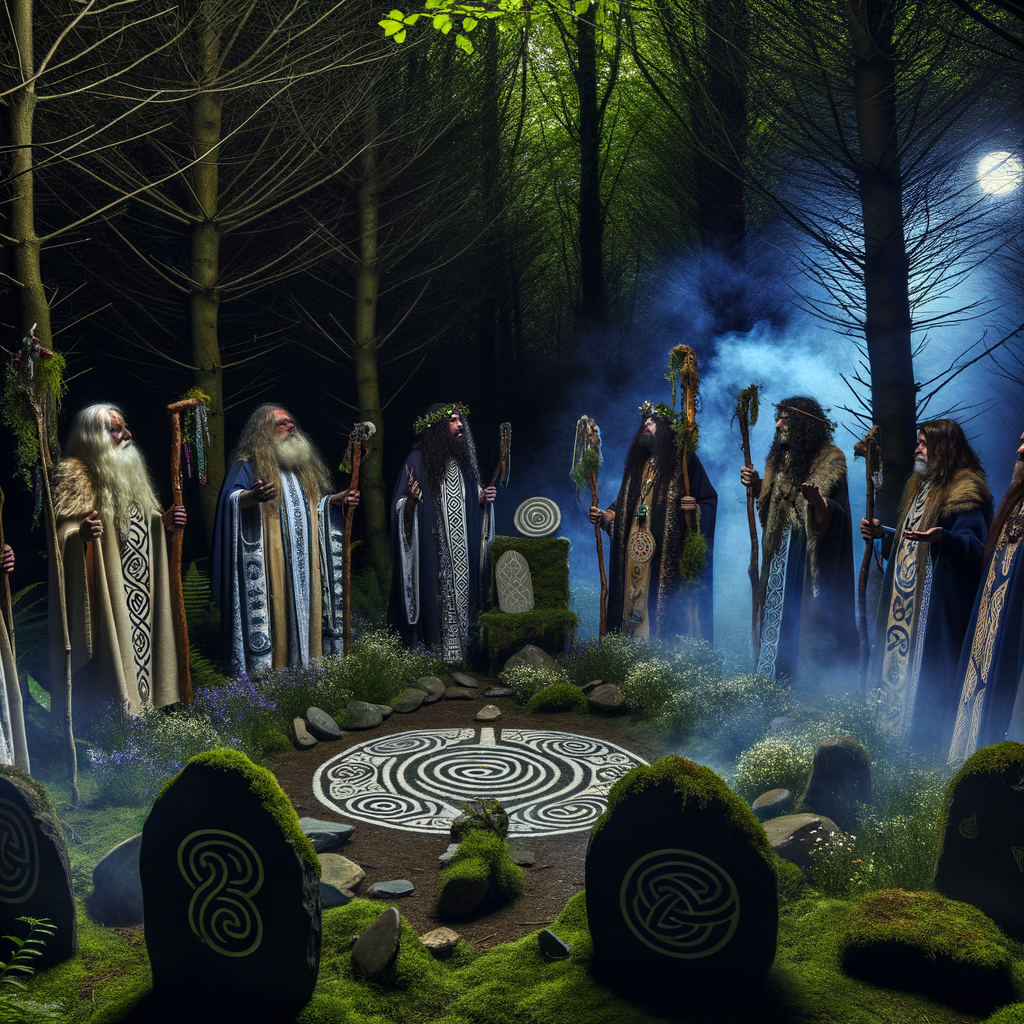Shrouded in a fog of mystery and legend, the Druids hold a special place in the history of Western magic. Although the details of their beliefs and practices have been largely destroyed by religious persecution and the passage of time, their legacy remains alive. They have inspired numerous stories and legends over the centuries, and their archetype can be found in characters such as Merlin, Radagast and Dumbledore. The influence of the Druids is deeply rooted in our culture, and their teachings, especially with the growing need to live in harmony with nature, seem more important today than ever. Who were these mysterious guardians of knowledge? What can we learn from them?
Druids - Priests, advisors, healers
To understand the druids, we must go back to the roots of ancient Celtic culture. In societies there, druids were respected members of the community, serving not only as religious leaders, but also as political, legal and medical advisors. Their influence was so great that they could even intervene between two armies, stopping a battle. They are somewhat reminiscent of the maestros from "Game of Thrones" - comprehensively educated and highly respected in their communities.
Where did the druids get their knowledge from? Unfortunately, we do not have any written accounts of the Druids themselves. Although they were probably literate, they believed that passing on knowledge orally was a better way to preserve wisdom. Druid learning took place in secret, deep in the forests. The term "druid" itself probably derives from the Proto-Celtic words meaning "expert of the oak" or "seer of the oak," suggesting that the forests in which they educated their disciples were an integral part of their secret knowledge. Unfortunately, the content of the Druidic teachings, transmitted in the form of long, memorized poems, has been lost in the darkness of history.

A Roman look at the druids
The sources of information about the druids are Roman records, by Julius Caesar, Cicero and Tacitus. The Romans, unlike the druids, meticulously documented their conquests, including the Celts and the Gauls, who were their enemies. Therefore, Roman descriptions of the Druids are marked by bias and manipulation.
The most glaring example is the description of human sacrifice. Julius Caesar wrote that the druids sacrificed criminals and even innocent people to the gods when there was a shortage of convicts. The method of these sacrifices was said to be the famous "wicker man" - a giant wooden puppet in which victims were burned alive. Are these descriptions true, or were they merely propaganda intended to discredit Celtic culture? We will probably never know.
At happiness The Romans not only described the bloody rituals, but also the beliefs of the Druids. We know that they believed in reincarnation and the immortality of the soul, which passed from one body to another after death. They were interested in the movement of the stars, both from a scientific and religious point of view.
Druid magic and the decline of their culture
In modern times, druids are primarily associated with magic. Their magical abilities are described as early as in Irish mythology, where the druid Cathbad uses the gift of prophecy to serve the royal court. Irish folklore features many druid characters, including women, suggesting that women played an important role in ancient Celtic culture.
Druid culture began to decline during the reign of Roman Emperor Tiberius, who introduced a law banning all Druidic practices. Later, Christians contributed to the further weakening of the role and beliefs of the Druids in Celtic society.
Druids today - how to follow their path?
The scarcity of information about the druids has led to the romanticization of their image. Many myths have emerged, such as that the Druids built Stonehenge or that the role of the bard was related to their practices. This poses a difficult challenge for modern pagans: how to put the teachings of the Druids into practice with so little historical information? What level of romanticization is acceptable?
Is it enough to follow basic Druidic principles, such as respecting nature and living in harmony with it? Or should we try to recreate the historical role of the Druids? Perhaps being a modern-day druid means developing a career and influence, but based on a philosophy and spirituality that respects the natural world. Perhaps we should focus on the role of druids as teachers and guardians of knowledge? How about creating an academy for those wishing to follow the druidic path, inspired by Scandinavian "forest kindergartens," where students learn and play outdoors, regardless of the weather?
I don't have the answers to all the questions, but I think they are worth asking. The world needs more druids, especially in leadership positions. I encourage you to follow this path if you feel resonance with it. It's up to us to make sure the druid ethos survives. But unlike our ancient predecessors, let's make sure we leave a written trail this time.
The Druids, despite the passage of centuries, continue to fascinate and inspire. Their profound union with nature, comprehensive knowledge and spirituality constitute a valuable heritage from which we can also draw today. Recreating their path in the modern world is a challenge, but at the same time an opportunity to find harmony and wisdom in an increasingly complex reality.